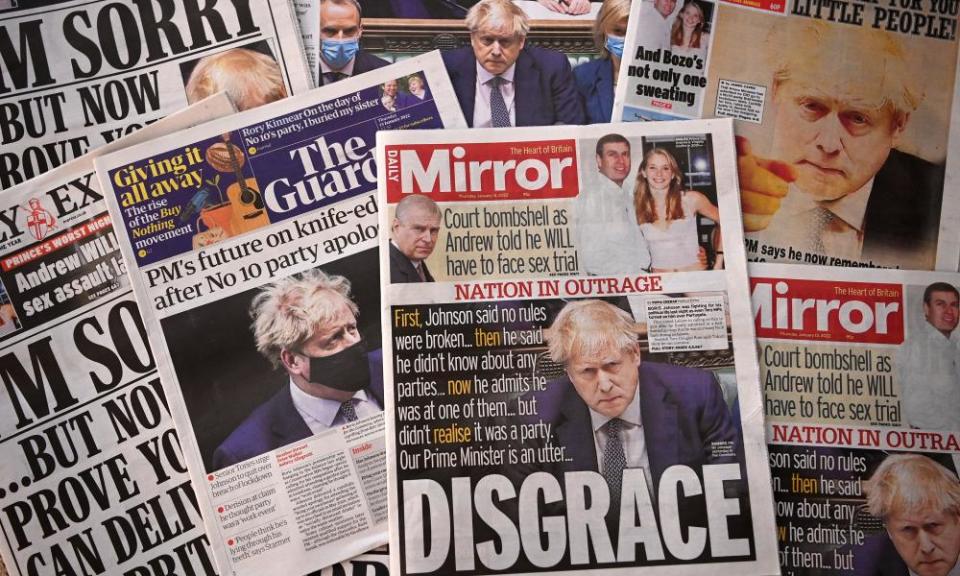Boris Johnson’s red wall crumbles as Leave voters call for him to resign

The headline polling figures are bad enough for Boris Johnson. Labour has a 10-point lead and the prime minister’s popularity is now at the same point as Theresa May’s at her lowest.
But digging beneath the surface, the latest Opinium poll for the Observer reveals a deeper and more serious problem: Johnson’s coalition of traditional Tories and pro-Brexit working-class voters is fracturing.
The poll shows that 46% of Leave voters who voted Conservative in 2019 believe Johnson should resign, compared with 39% who want him to stay. These people are the core of the prime minister’s base and if they desert him, he is sunk.
Johnson’s 2019 general election win was the result of his appeal to working-class Leave voters in the so-called “red wall” northern seats, while retaining many Remain-voting Tories in the party’s traditional middle-class base. Since then, some of the socially liberal, well-off voters charmed by David Cameron have been put off by Johnson’s behaviour in government, enabling a Liberal Democrat resurgence in the North Shropshire and Chesham and Amersham byelections last year.
With a working majority of 77, the Conservatives can afford to lose some of those supporters if it keeps the rest of its voter coalition together. But losing the people who wanted to “get Brexit done” would be catastrophic, and the poll will confirm the anxieties of Tory MPs seeing their inboxes fill up with messages from angry constituents who do not normally contact them.
The poll shows that 48% of all 2019 Conservative voters say he should resign as party leader. Even 30% of those who would vote Tory now believe he should go. Labour are now in their biggest lead position since 2014, 10 points ahead at 41%.
“Today’s poll adds to growing evidence that the ‘partygate’ scandal is jeopardising the party’s support from red wall Leavers too,” said Rob Ford, professor of political science at the University of Manchester.
“Such voters have long felt disaffected from, and distrustful of, a political class they felt ignored their concerns and lived by its own rules. The resentments once mobilised against the EU by the promise to ‘take back control’ now have a new target – an out-of-touch Downing Street team who partied while the Queen mourned.”
Opinium found 76% of respondents think Johnson broke lockdown rules, with 8% saying he did not. Only 13% think he is telling the truth, against 64% who do not. Sixty-seven per cent say the police should investigate.
Johnson appears to hope that by asking people to wait a week or so more until civil servant Sue Gray’s report, he may be able to ride out the storm. Yet people appear to have made up their minds already – asked if Johnson should resign if it turns out he broke lockdown rules, 67% say yes. But 63% of UK adults simply believe he should step down, compared with 22% who say he should remain as leader of the Conservative party.

Yesterday, the ConservativeHome website reported that 53% of its panel of party members believed Johnson should quit. The site’s editor, Paul Goodman, said this was lower than the 71% who wanted Theresa May to go in 2019. “Nevertheless, that over half of party members want the prime minister out, if this return is representative, is a humiliating result for him, and shows a loss of confidence that may not be reversed,” Goodman wrote.
Among general voters, Johnson’s net approval is the same as May’s before the 2019 European elections that heralded her resignation, according to Opinium. The prime minister now has a net -42% approval rating (22% approve and 64% disapprove).
Labour leader Keir Starmer remains stable at a +4% net rating (36% v 32%) and is the preferred prime minister of 30%, compared with 21% for Johnson.
“Johnson has shifted from the party’s biggest asset, with a Brexit-fuelled appeal separate to the Conservative brand, to its biggest liability,” Ford said. “The Conservatives may now be damned if they do and damned if they don’t.”
Of Johnson’s potential Conservative successors, Rishi Sunak is viewed most positively – 45% say he would make a good PM with 32% against. The other widely tipped candidate, Liz Truss, has the support of 22% with 38% against.
In the rest of the field, Sajid Javid is best placed (30% for v 44% against), ahead of Jeremy Hunt (26% v 43%), Michael Gove (24% v 53%) and Priti Patel (20% v 61%).
“Sticking with Johnson risks further contaminating the party brand if the scandals continue and voter fury intensifies,” Ford added. “Party veterans with memories of the 1990s will recall how hard renewal can become once their party is toxic. Yet replacing Johnson brings its own risks, as none of the frontrunners for the succession looks likely to replicate his unique appeal with voters otherwise suspicious of the Conservatives.”
Unlike 2015 and 2019, when the Conservatives recruited nationalist Eurosceptic voters from Nigel Farage, there was now no Ukip or Brexit party to squeeze, Ford added.
“Keir Starmer’s personal ratings, though mediocre, are better than his predecessor and improving. The Conservatives’ hopes may now rest on whether voters’ longstanding reservations about Labour outweigh their growing anger at a prime minister now widely seen as a liar and a law breaker unfit for office.”

 Yahoo News
Yahoo News 